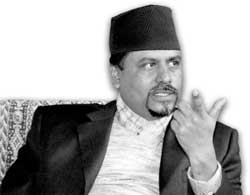 The recent government decision to allow Kantipur Publications to operate a national television service has sparked off new debate in Nepal. Kantipur Publications publishes five newspapers and newsmagazines and also operates an FM radio station.
The recent government decision to allow Kantipur Publications to operate a national television service has sparked off new debate in Nepal. Kantipur Publications publishes five newspapers and newsmagazines and also operates an FM radio station. It is internationally mandated that allowing a media house to operate all forms of mass media is dangerous, because that allows it to control information to serve its own interests. In order to avoid this danger, even larger democracies such as the US and the United Kingdom have not permitted a single media organisation to run broadcast as well as print publications.
The UK's Radio Authority and Independent Television Commission also exercises some restrictions in the broadcasting sector. Britain's 1996 broadcasting law restricts an organisation involved in national radio broadcasting from getting involved in television, and vice versa. Similarly, a publication house commanding more than 20 percent of market cannot enter national-level radio and television broadcasting. Publications commanding less than 20 percent of market are allowed to apply for licences, but permission can only be granted on the basis of public support.
The Nepali government issued a license to Kantipur Publications for terrestrial television broadcasting on 17 April. Kantipur has been publishing newspapers for nine years and since 1998 has been operating Kantipur FM in Kathmandu with its relay transmission centre in Dhankuta.
In Europe, mass media establishments are not allowed to work in both broadcast and print media so that no individual organisation can "cross subsidise" its products, creating unfair competition or a monopoly. Senior journalist Hiranya Lal Shrestha believes allowing a single establishment in all sectors of mass media could create a monopoly that will have a negative effect on the county's politics and economy. "Allowing a monopoly of a single media house in all sectors of mass media is as dangerous as allowing foreign investment in mass media," claims Suresh Acharya, president of the Federation of Nepalese Journalists. He added, "It is a threat to the whole nation. This could control the process of information dissemination, and manipulate public opinion on various national issues."
Experts believe that the lack of clear legal provisions on foreign investment and whether one media establishment can operate in all kinds of mass media channels is resulting in confusion and that leaves the regulations open to contrasting interpretations to suit individual interests. Some media experts believe that allowing an establishment to enter all sectors of mass media should not be interpreted negatively. Others claim that the issuing of the license constitutes a misuse of authority.
Journalist-turned-parliamentarian Hom Nath Dahal said Europe's Time publication is linked with the TV channel CNBC, India's Sahara TV channel and India Today magazine are both involved both in publication and broadcasting. The government's decision must thus not be judged in isolation from international practices.
"The government can be criticised if it allows one party to enter both print media and broadcast and prevents another party from doing the same. But if it selects one particular party from a competitive bid, it should be allowed to do so," said Dahal. However, he also believes that there is a threat of a monopoly if the same party is allowed to be involved in all kinds of mass media.
Kailash Sirohiya, managing director of Kantipur Publications claims that the creation of a monopoly is impossible in the present open market economy. "Going against the national interest and creating a monopoly are out of question if an institution is aware, and committed to serving the nation's needs and the interests of the audience," he said.
Minister of Information and Communication Jaya Prakash Prasad Gupta said the government decision fully complies with the National Broadcasting Act and that the decision was taken in accordance with all legal procedures. "Our concern should be our own needs and our own legal foundation. International practices and legal provisions should only be given secondary consideration," Gupta said.


